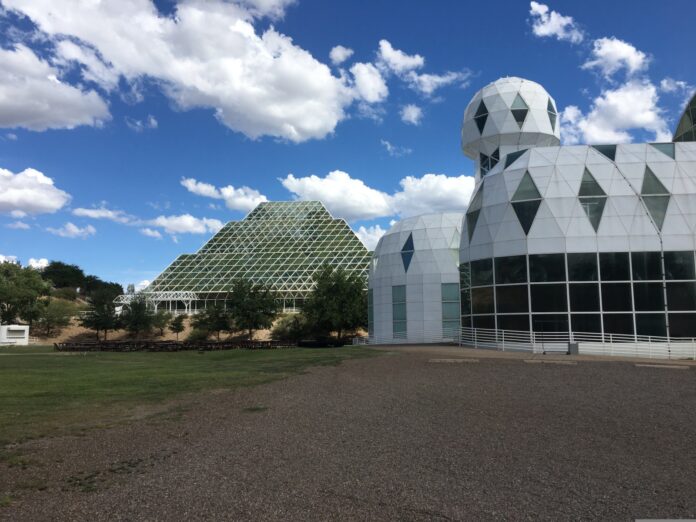By Maria Betancourt
In the realm of research, Biosphere 2 stands as a pioneering experiment that captured imaginations with its ambitious attempt to replicate Earth’s ecosystems within a sealed environment. Conceived as a self-sustaining miniature world in the late 1980s, Biosphere 2 has evolved into a crucial platform for understanding the dynamics of our planet’s biosphere and the effects of climate change.
Situated in the Sonoran Desert, the massive structure comprises several biomes, including rainforest, savannah, desert and ocean. In 1991, eight individuals entered Biosphere 2 to embark on a two-year mission, living entirely within its confines and simulating life on a distant planet. This fascinating experiment failed to produce sufficient air quality and food to sustain the eight terranauts.
In recent years, Biosphere 2 has emerged as a critical University of Arizona research facility. Controlled experiments within its sealed environment allow scientists to manipulate environmental variables such as temperature, precipitation and atmospheric composition to simulate future climate scenarios. By observing how different ecosystems respond to these changes, researchers gain insights into the potential ecological consequences of climate change.
We depend on a healthy reef tract for jobs, tourism, commercial fishing and coastal protection. Biosphere 2 has unique capabilities for simulating marine environments and has emerged as a resource for coral reef research. Coral reefs are among the most biodiverse ecosystems on Earth. Understanding their responses to environmental stressors is crucial for their conservation.
Biosphere 2’s Ocean Biome, comprising a million-gallon saltwater habitat with coral reefs, provides a controlled environment for studying marine ecosystems. Equipped with advanced monitoring systems and maintained at precise temperature, salinity and nutrient levels, this biome allows researchers to recreate conditions in natural coral reef habitats. By subjecting corals to different environmental scenarios and monitoring their physiological and ecological responses, researchers can gain insights into the mechanisms of coral resilience and identify strategies for mitigating the impacts of climate change on reefs.
Biosphere 2 also facilitates research on the broader ecological dynamics of coral reef ecosystems. Scientists can study complex environmental processes such as nutrient cycling, trophic interactions and community dynamics by examining interactions among corals, algae, fish and other reef organisms. These studies contribute to understanding the factors influencing coral reef health and resilience in the face of environmental change.
The insights from Biosphere 2 have practical implications for conservation and management in the Keys and across the globe. By identifying the most resilient coral species, understanding their physiological responses to stress and studying the factors promoting reef recovery, researchers can inform conservation strategies to preserve and restore coral reef ecosystems.
Future research directions include investigating the role of microbial communities in coral health, exploring the potential for coral adaptation and acclimatization to changing environmental conditions and developing innovative restoration techniques for degraded reefs.
























